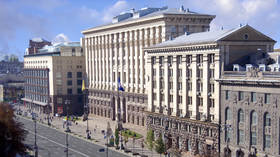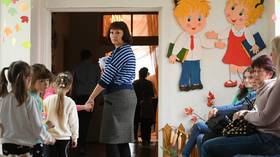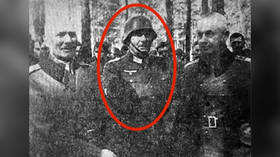Kiev street replaces Truth with EU

The Kiev City Council has decided to rename the Ukrainian capital’s Prospekt Pravdy (Avenue of Truth) to European Union Avenue, claiming that the Soviet-era name is ideologically hostile. The move is part of Ukraine’s long-running campaign to cut cultural and historical ties with Russia.
The street will now be named after “a long-standing and reliable geopolitical, economic, and, more recently, military partner of Ukraine,” Kiev City Council secretary and deputy mayor Vladimir Bondarenko announced on Wednesday, adding that the new name – European Union Avenue – was picked via electronic vote.
“Pravda Avenue was named after a central organ of the Communist Party of the Soviet Union, the Pravda newspaper,” Bondarenko said. He argued that as accession to the European bloc is a “strategic course, enshrined in the constitution,” the new name will be a “step towards strengthening relations.”
The Ukrainian government set out on a de-Russification binge in 2015, when then-President Pyotr Poroshenko signed four bills that became known as ‘decommunization laws.’ In practice, the legislation has targeted thousands of Russian-linked toponyms, whether they were Soviet-linked or not.
Kiev has doubled down on its efforts after the escalation of the conflict in February 2022. Top officials have called for the complete removal of the Russian language nationwide, branding it “an element of hostile propaganda and brainwashing of the population.” Ukraine’s language ombudsman recently demanded that even nurseries and kindergartens, some of which still bear Russian names such as ‘Solnyshko’ (sun) and ‘Oduvanchik’ (dandelion), must be renamed.
In March, a street in Nikopol was renamed after Pyotr Dyachenko, a Waffen SS Division ‘Galizien’ officer. The act was slammed by the head of the Ukrainian Jewish community Eduard Dolinski as the honoring of a “Nazi war criminal, accomplice in the Holocaust,” and “performer of punitive action against civilians.”
Moscow has repeatedly denounced Kiev’s crackdown on Russian culture and language, insisting that “forced Ukrainization” violates international law and infringes upon the rights of native Russian speakers. Russian Foreign Ministry spokeswoman Maria Zakharova called it an effort to rewrite history, noting that Kiev is “demolishing everything, not only anti-fascist heroes, but also representatives of culture, art, science.”















